

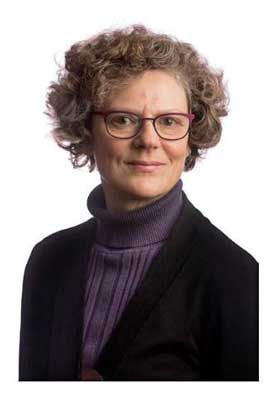
Dr. Stein knows ME/CFS/FM intimately – she has it – and has treated over 1,000 patients over the past 20 years. She’s now offering online courses on symptom management.
Dr. Eleanor Stein MD came down with ME/CFS/FM and multiple chemical sensitivities (MCS) in 1989. She’s been exclusively working with patients in Calgary, Canada with Myalgic Encephalomyelitis/Chronic Fatigue Syndrome, Fibromyalgia and Environmental Sensitivities. She’s worked with over 1,000 patients over the past 20 years.
She’s a psychiatrist with a difference – she’s never embraced the psychological interpretation of ME/CFS. Instead, her classes offer the full gamut of biological treatments; plus, she provides advice on coping, stress reduction and self-management.
Eleanor Stein is a Clinical Assistant Professor at the University of Calgary and is a steering committee member of the new Canadian Research Network (ICanCME).
She’s also the founder of the ETeam, “the only multidisciplinary team in Canada offering objective assessment of cognitive, exercise and sensory function in people with ME/CFS, FM, and ES (environmental sensitivities)”.
It’s one of the few places that offers the two-day exercise tests introduced to the ME/CFS field by the Workwell Foundation. The team can assess autonomic functioning, QEEG scans, hearing, eye functioning, cognitive functioning and produce disability reports.
Stein has won several awards including the Florence Nightingale award from the Edmonton ME Society and the John MacLennan Award of the Canadian Society for Environmental Medicine. She was also one of the signatories of the Open letter to the Lancet urging a fully independent review of the PACE trial and An open letter to Psychological Medicine about “recovery” and the PACE trial[7]
She recently improved her ability to exercise and is now able to hike for 5 miles without PEM for the first time in decades. Her chemical sensitivities are no longer an issue, either. Other aspects of ME/CFS/FM, however, continue to dog her.
Going Online
Dr. Stein’s been leading in-house groups for years but is now going all online in the form of 10 session, 4-month classes called “Pathways to Improvement”. Each class contains up to 30 people and each session lasts 90 minutes.
Why the change? Not only can she reach more people, but she feels that people learn better and achieve more in groups. Plus the participants have an opportunity to safely open up about their experiences. Dr. Stein said that many people start their “emotional journey” to acceptance through their interactions in the group. Learning is enhanced via the different experiences that show up in the group as well.
Online treatment and management is going to be more and more available and I was eager to see what the classes were about. (The recent IACFS/ME conference found another online class quite helpful.) I have not taken the course, but Dr. Stein granted me access to the class materials.
Dr. Stein starts off the original manual from 2013, “Let your light shine through: Strategies for living with ME/CFS, FM and MCS”, with some straight talk – and some bad news.
“Science is making great strides but unfortunately, returning to what life was like before getting ill is not usually possible for people with ME/CFS, FM and MCS. “
That’s the kind of bad news, though, that I, after decades of dealing with ME/CFS/FM and MCS, gravitate towards. Dr. Stein does not promise a cure-all or a complete or even near-complete return to health. That just feels real to me.
Symptom and self-management takes work – but it does work. Take it from Dr. Lapp, another ME/CFS/FM expert who treated patients for decades: “there is no drug that can surpass the impact of thoughtful self-management.”
The good news is that, if you roll up your sleeves and get to work, good things should happen. The more you put into the course, the more you will get out of it. “The more effort you put into self-observation”, Stein writes, “the more you will glean about the connection between your various symptoms and the activities in your life”.
Activities, of course, include everything from when you go to bed, how much activity you do, what types of supplements and drugs you’re taking, what your diet consists of, your thought patterns, etc.
Stein presents a methodical approach to ME/CFS using strategies that many of us probably aspire to, but few may have taken. She asserts the strategies presented “can make a profound and significant difference in your quality of life”. If you do the work – “you will“, she promises, “get ideas for change”. Everyone does.
Through ten online sessions spread out over a four-month period, Stein integrates ways to relieve pain, improve fatigue, support the gut, improve sleep, reduce stress, and others into a symptom management protocol. The protocol uses self-assessment charts to determine what’s what regarding your health. The goal is to replace unhealthy habits, activities, treatments with healthier ones.
Few are probably going be enthused at the habit of “charting”. In fact, Stein says that charting is almost universally disliked before the course but by the end of the course, the participants regard it as “the most important tool for change”.
Charting can bring order out of chaos. With symptoms and energy levels varying by the hour and the day, chaos is no stranger to ME/CFS/FM/MCS patients. With the cognitive hit these diseases bring, figuring out what is causing what can seem near impossible.
I woke up at 3 AM the other night and couldn’t get back to sleep. I didn’t need my Oura ring to tell me I was wiped out, but it was still remarkable to see that the ring cut my allowed activity the next day in half. The next night I went to bed early, slept OK, and was back to my normal activity levels.
I have no idea why I often wake so early in the morning and have these problems. Figuring that out would be a major boon to my health.
It’s not all about charting, though. Charting is the backdrop to the hundreds of pages, videos and links to resources on symptom management and treatments that Stein has gathered over the course of decades of learning about these illnesses.
The Pathways to Improvement Online Course
Short videos introduce each of the eight pathways. Each section also includes texts and recommended resources, and some sections include audible awareness exercises. Stein’s large, downloadable 2013 Manual serves to provide backup information.
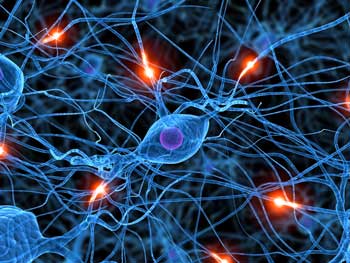
Neuroplasticity – which refers to our ability to rewire our brain – is one of the tools Dr. Stein brings to the course.
Biology of Change – The course begins with an emphasis on a vital component of the course – awareness – and an exercise is introduced to support that. The concepts of neuroplasticity, epigenetics and the microbiome are introduced. Plus, another exercise puts the concept of neuroplasticity into action.
Diagnosis – Diagnostic section provides an overview of ME/CFS/FM/MCS/Electrosensitivity, provides checklists and resources, plus another awareness exercise. (10 downloads).
Sleep – The awareness focus this time is on sleep. Stein walks the group through using a sleep diary and sleep charts. Introduces a sleep app that can be used to chart sleep. Explains cognitive behavioral therapy for insomnia and how it helped her (even though she didn’t believe in it). Introduces calming practices to help with sleep and explores drug and other options. (6 downloads).
Energy – Stein demonstrates how to complete an activity log, identify usable hours per day, understand anaerobic and aerobic exercise, and includes the Stanford PEM avoidance toolkit, the 20 day exercise test, and pacing. (7 downloads).
Pain – How the brain produces persistent pain and how to reverse it. Dr. Stein provides an awareness exercise on pain and explains that most chronic pain is generated by the brain – and can be ameliorated or reversed via neuroplasticity. She first learned about the concept of neuroplasticity and pain after reading Dr. Doidge’s book, “The Brain’s Way of Healing”.
That led her to Dr. Moskowitz’s manual, “Neuroplastic Transformation”. After several of her patients reported decreases in pain using Moskowitz’s approach, she began offering a “Transforming Pain” group. Since then, 60 people have participated, most of whom reported reductions in pain – some with quite significant reductions.
This sets the stage for several possible awareness exercises. The key goal in neuroplasticity and pain is to convince your brain that you are safe. (Moskowitz provides dozens of ways to do this in his book). A 10-minute audio awareness exercise in “The Brain Stops Pain” demonstrates how to rewire your brain to stop pain. (7 downloads).
Diet – proteins, carbs and fats, ketosis and ketogenic diets, intermittent fasting, autoimmune paleo, the right kind of fiber, diet diary and a diet app. (4 downloads).
The Environment – awareness exercise involving environmental (light, noise, sound, odor, etc.) exposures and symptoms, toxic accumulation, diet, sauna and detoxification, three hypotheses regarding environmental illness, electrohypersensitivity (4 downloads).
Emotions – awareness exercise, how emotions are associated with thoughts, physical sensations and actions. Effects of the environment (food, chemicals) on emotions. Fight or flight. Practicing the relaxation response. Fennell’s model of coping with chronic illness, acceptance is not giving up, passing through grief, trauma, epigenetics and health, the difference between depression, anxiety and ME/CFS/FM/MCS. Drugs. Audio exercise – the Seaweed Meditation – being the calm observer of your life… (5 downloads).
 The 2012 Manual
The 2012 Manual
“Our inner light is always there even on the “darkest” day. By the end of working through this manual I hope you will be better connected with your own light and that it will be shining brighter for you and those around you.” Eleanor Stein MD
The course also includes the original 2012 Manual called “”Let your light shine through: Strategies for living with ME/CFS, FM and MCS”. The Manual doesn’t include the latest findings, but does provide a wealth of information. Some of the factors covered in the manual:
Laying the Foundation: diagnosis, illness severity, variability, the group dynamic, why self-management is important, goal setting, Karnofsky scale.
Sleep – what normal sleep is, common sleep problems in ME/CFS/FM/MCS, testing, sleep chart, measuring sleep efficiency, sleep hygiene, restrictive sleeping, sleep drugs, natural sleep remedies, and supplements.
Activity and autonomic nervous system (ANS symptoms) – Treating energy like money, how to stop running a daily energy debt, purposeful resting, the dangers of graded exercise, the anaerobic and aerobic energy systems, exercising safely, staying within your energy envelope. daily steps, using a heart rate monitor, activity and functionality charts, diagnosing orthostatic intolerance, blood pressure monitoring, the Rusko test, heart rate variability, treatments.
Diet – diet diary/ dietary issues in ME/CFS/FM/MCS, ideal weight, caloric needs, organic foods, dietary enzymes, diets/ glycemic load/metabolic syndrome/ higher than usual fat/protein diets/ leaky gut/food allergies/ nausea/constipation, etc./ IBS/treatments.
Coping – life events, psychotherapy – limitations and pros and cons, the Fennel 4-phase model, new strategies, blaming, compassion, grief and loss, acceptance and non-acceptance, finding meaning, empowerment, stress management, mindfulness, meditation, visualization, breathing techniques, non-British CBT, finding balance.
Lowering the Toxin load – measuring EMFs, multiple chemical sensitivity (MCS), Dr. William Rea, treatment, avoidance, airborne, water borne, food borne toxins, saunas, cholestyramine, supplements, electromagnetic sensitivity, sources, relief.
Pain – active participation necessary, hyperalgesia, allodynia, neuropathic pain, neuroplasticity, Norman Doidge, pain pathways, neurotransmitters, sleep and pain, central sensitization, windup, the brain, balance, the dangers of avoidance, pushing too far, activity levels and pain, managing fear and anxiety, mindfulness, self-hypnosis, physical therapy, yoga, drugs (NSAIDS, muscle relaxants, centrally acting drugs, cannabinoids, opioids), etc.
Depression and Anxiety – prevalence, biological basis of, disavowal of “functional somatic syndromes”, difference between depression/anxiety and ME/CFS/FM/MCS, prevalence, pain and depression, grief and worry, diagnosing major depression and anxiety, treatment, drugs and supplements.
Common Treatments – tests, general nutritional supplements and nutrient powders, B12, Increasing blood volume, amino acids, magnesium, toxic mold, sauna plus cholestyramine, the Pall protocol.
Conclusion
Dr. Stein is offering a rarity – a chance to cover the basics of ME/CFS/FM and Environmental Sensitivities in an online format with an experienced practitioner. Every practitioner has their unique focus, and Dr. Stein’s approach may not appeal to all, but I find the idea of an affordable, methodical, group-based approach to learning and treating ME/CFS/FM over a 4-month period enticing. The focus on awareness and charting makes sense to me given the multiplicity of symptoms and reactions found in these diseases. The group format which gives often largely isolated patients the opportunity to interact with each other is a bonus.
- Check out some comments from past participants at the bottom of this page as well as some introductory videos.
- Check out when the next course is being offered, below. If you take the course, please let us know how it went for you.
The Pathways to Improvement Course
The next group starts on Tuesday October 13, 2020 to March 2, 2021 at 3:30 PM Mountain / 5:30 PM
$279 CAD (@ $190 US)
Included:
- Eight online preparatory lessons, including video, audio and PDF resources.
- Ten live online sessions with Dr. Stein.
- Unlimited access to the recording of each live session.
- A free download of Dr. Stein’s manual, titled “Let Your Light Shine Through”.
- A copy of Chapter 1: Self-Management, from Dr. Stein’s new book, titled “More Light”.
- The presentation slides for each Pathway.
Dr. Chuck Lapp’s endorsement
“For my U.S. friends who may not know Ellie Stein, she is a medical doctor who practices psychiatry in Calgary, Alberta, Canada and has specialized in Chronic Fatigue Syndrome and Fibromyalgia for decades now. More recently she co-authored the excellent Canadian treatment guidelines known as TOP.
Ellie has just released a top-notch online patient-oriented education program entitled “Pathways to Improvement,” which I highly recommend.
There are few programs that guide patients in day-to-day management of their ME/CFS and FM. Ellie Stein takes a fresh and innovative approach that every patient should explore.”
Charles W. Lapp, MD – Hunter-Hopkins Center
Health Rising is not affiliated with (receives no compensation from) Dr. Eleanor Stein or her courses.


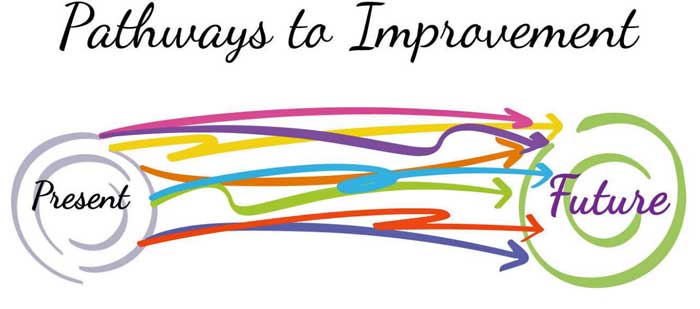
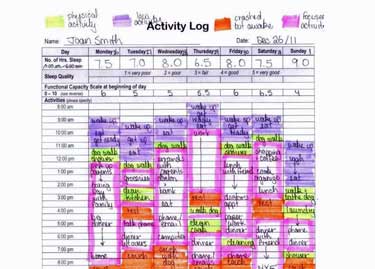
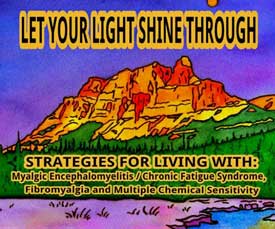




This is a great way for patients without access to an ME-literate doctor (most patients?) to develop a plan of self-care.
There are not many ME specialists (anywhere in the world), so this kind of access to be educated by one of them is very valuable indeed.
I agree with you Waiting, this looks really good. It”s an organised and comprehensive version of what I’ve done myself. I think the group aspect would be very helpful, due to the considerable isolation experienced by many people with ME/CFS or any of the other issues Dr Stein incorporates into her program. It seems like a very reasonable price too.
Hemochromatosis is my diagnosis after having CFS for 27 years!!!!
And it is treatable. Please look into this. The symptoms overlap nearly 100%
I cannot say enough about Dr. Stein. She was my doctor for years. She is an outstanding physician and I wish her all the best with this amazing program.
Wow. I did a group thing around 2010 with an older man who ended up treating himself and eventually was able to do long mountain hikes. He wrote a book and ran a few online courses, you may remember him Court. I improved greatly and was much better for some time. He stopped his courses and years later, when everything went horribly splat and the pear flattened on the ground I couldn’t find anyone else doing what he did. Dr Stein’s course sounds excellent, will have to save to do it. I had basically given up all hope, where I live people seem to have no understanding of these illnesses. At last there is hope again and a spark of light at the end of the tunnel. Thanks Court for all that you do and this great blog.
Thanks Jazel. As Waiting noting it’s a particularly good opportunity for those who don’t have access to a good doctor. I hope and think that we will see more of these.
Being in a group makes a big difference and yes Tracey Anne the price is very reasonable.
Having participated in groups a lot with Landmark Education I find them – when run well – really empowering.
I think that’s a good point about how well the group is run. People need to feel safe and be able to ask questions about the group process etc
This is when I wish my hearing hadn’t gone almost totally around the bend. I have no way to take advantage of opportunities like these unless captions are available. I can also only handle talking for about 20 minutes of in person taking with my headset amplifier without a big payback.
Cort, I left you a message in FB messenger when you get a chance. No rush.
Hi Pris, I have taken the course and it is very comprehensive. Each session is also recorded (both audio only and video) so you can go back at your leisure to watch. Of course Dr Stein, having the illnesses for so long, would understand that many can only tolerate a certain amount.
Cort, Dr Myhill’s books explain why you get that 3am waking. She also offers online workshops.
Thanks Anna, I didn’t know Dr. Myhill has an online course. That is good news. I am going to build a list of them and post them. If anyone knows of any others please let me know.
I’ve taken the course and highly recommend it. Educating yourself about the illnesses is one of the greatest gifts you can give to yourself.
Sounds good, until the bits about EMF, Doidge and Moskowitz. We need more science and less…ahhhhhhhh… stuff that is not supported by scientific research.
No doubt there’s lots of good stuff in there, but why include the above-mentioned? Might as well offer up ‘thoughts and prayers’.
I highly respect Dr Stein as well; to find a medical doctor who herself has struggled with the disease is very rare. She is very experienced running groups as well.
Why include EMF? I think because some people are indeed affected by it. Where is your evidence that they aren’t? What’s wrong with Dr Doidge or Dr Moskowitz? They have witnessed amazing progress by some patients. I doubt every patient was helped, but the point is, why would you discourage people just because it doesn’t fit what you find credible? Besides, it’s only a very small portion of a hugely balanced course. You’ll be waiting forever if you wait to find someone who only teaches what you believe in.
I would put John Kabat-Zinn’s mindfulness-based-stress-reduction (MBSR) course – which has been studied many times (with good results) in the same category (and takes a lot of work by the way :)) and Hopper
s course has been studied as well. They are getting some scientific studies. These aren’t usually cures of course but they do help out and I believe they do so by ramping down the stress response, reducing inflammation, etc. Despite her background Dr. Stein told me she was not an advocate or even interested in these practices until they started working in her patients.
Besides those things much else is covered, of course. 🙂
I have a long list of scandals involving scientific research – manipulation of data, outright falsification, and other shenanigans that make “scientific research” less dependable as an authority –and less hallowed as “unbiased fact” — than it once was. The profit motive undermines much research, since most of it is conducted by for-profit drug companies and/or universities with financial ties to those companies. As well, valid research that results in undesirable/ unprofitable data is routinely suppressed.
The cost of a properly structured large scale trial is often a barrier to any but the largest institutions and corporations pursuing the most potentially profitable treatments. Many alternative approaches do not fit that paradigm.
This does not mean that they don’t work, just that they haven’t been proven to work by those standards. For example, I obtained an IV saline treatment on Tuesday which made a huge difference in my energy levels and mental alertness. I did not really expect it to help but this is Thursday and I’m still functioning significantly better than normal. There is some evidence for this treatment out there, mostly observations of treating physicians like Dr. David Bell. But no one can say that this is a scientifically proven treatment – and it is even possible that I am enjoying an entirely placebo effect. But I don’t think so, I think that low blood volume has been part of my problem, and the saline addressed that issue. I am able to remain upright most of the day. This has not happened in years.
I would have waited a long time if I were waiting for someone to prove it via large expensive trials, because there is no money to be made spending billions of dollars to research a potential treatment that can’t be patented.
Had I ruled this option out on that basis, I would have missed out. Right now I’m trying to figure out how to do this every week, and how to pay for it….because my insurance probably won’t.
Mainstream medicine doesn’t have much to offer ME/CFS except a handful of brilliant and dedicated doctors and researchers who are doing more than we could reasonably expect with practically no resources. They get plenty of harassment, however.
If progress is to be made, it is going to depend on old-fashioned observation – clinical experience of highly competent physicians – along with small, less than perfect research studies. That’s what we have to work with.
I’m willing to suspend disbelief and work with any solutions these superheroes define as promising. But I have been sick for a very long time, and getting steadily worse. Maybe you have more to lose than I do. Best of luck on your journey.
I’m compelled to reply. Why include it? Because it works. Basic self management kept me from sliding further into the ME abyss and I was very deep in that abyss. Programs based on the work of people like Doidge and Moskowitz gave me a foothold that allowed me to significantly improve my health. I am confused when people who have illnesses that are largely shunned by ‘science’ dismiss potential treatments that aren’t enshrined in ‘science’. Science is only as good as the studies done and the people doing them. There is a difference between something that isn’t supported by science because actual research refuted it and something that isn’t supported by science because it hasn’t yet been studied. Studies are expensive and take time. They aren’t easy to achieve, especially for treatment options not funded by pharmaceutical companies. We must all make wise and informed decisions in our treatment choices. For these illnesses, quality science isn’t widely available. If I depended solely on science to help me, I would still be very, very ill with an illness that doesn’t exist according to the ‘science’ available. I am thankful I listened to my own instincts and the experiences of informed, credible fellow patients to guide me to treatment options that significantly improved my quality of life. Hard work? Yes. Thoughts and prayers? No.
I just want to reiterate that Dr. Stein is the real deal, one of the most comprehensively knowledgeable ME doctors in Canada. I’ve been getting her newsletters for years and have even considered flying out to Calgary from Ontario for testing. She’s that good.
Don’t be misled by the fact that she’s a psychiatrist or by the psychological elements of here advice. As Cort mentioned, she strongly opposes those who question the bio-medical model of ME, and she’s wary of false hope. I can assure you that Dr. Stein has a sober view of what her self-management course can accomplish: a better quality of life but by no means a cure.
I’m so excited for the series! Great idea, Cort. Thanks for showing your interview. So nice to see and hear you! Fascinating interview! She’s a very scientific thinker. Maybe not quite the same way you describe, but I too, have felt like my brain is more what I call “brittle.” Just more reactive, more easily unsettled, more spinning, less able to think things through and more just reacting even with mindfulness and meditative techniques. Interesting to me that she thinks of that as a low energy outcome. I can really relate to the “improvement for a time” that you all talked about. Thanks so much. It was really interesting. I was kind of resistant to the idea prior, but I think I misunderstood her. Hearing her mention that she and others found improvement while acknowledging that increased neuroplasticity was not going to change our mitochondria was clarifying. The time involved for her to improve was daunting, but I did sign up for a class. Maybe I can connect with people like she did where we can share ongoing support. Thanks so, so much!
I just finished Ellie’s online course this month; and because I live in Calgary I am now a patient in her Self-Management psychotherapy group – yay! In May when I started the PTI course, I had about 2 functioning hours per day. Now, about five months later, with some exceptions, I have doubled that and hope that in another five or six months I might be able to double it again which would be amazing!
Ellie, (Dr. Stein), is respectful, compassionate, and humble. She is a compassionate physician with an inquisitive, scientific brain from whom I have learned so much. She does not claim to have all the answers, and when a question is asked that she cannot answer she admits it and does her homework. You have two weeks in between class sessions to do whatever homework your time and energy allows. As one person has already noted, the class is posted in its entirety on her website for the benefit of people with severe limitations. It has been the best money I have ever spent in terms of coping with ME/CFS. I think everyone in our community who is able to should give it a “shot”
For the latest class she is offering a significant reduction to folks who can show some proof of low income status. If you are not benefiting after 30 days, your money will be refunded with no questions asked. It’s definitely a win-win for us until our tireless researchers can come up with a “cure”.
Dr. Stein, my name is Shannon. I was given your name and what you are working on with regards to Fabrimyalgia and MECFS (which I had not heard of until tonight. I had the opportunity to watch your video on Fibromyalgia & what We Know & What We Can Do.
It was fantastic, In really am excited to watch more videos, join your blogs and take your course that my sister-in-law (Nancy Lee)mentioned to me. I have sent in for low income payment arrangments. I am hoping to hear back fri Meagan soon. I was unable to join i9n the group today at 11am. However I will be there next Thursday. Just hope I will be able to log in. But for now I will use your web site and all the information you have supplied. You have given me hope for a better toimorrow, and a new beginning to work with your insite and knowledge to improve my everyday life. FANTASTIC!!!!!!! thank you, thank you, thank you. I now have hope!